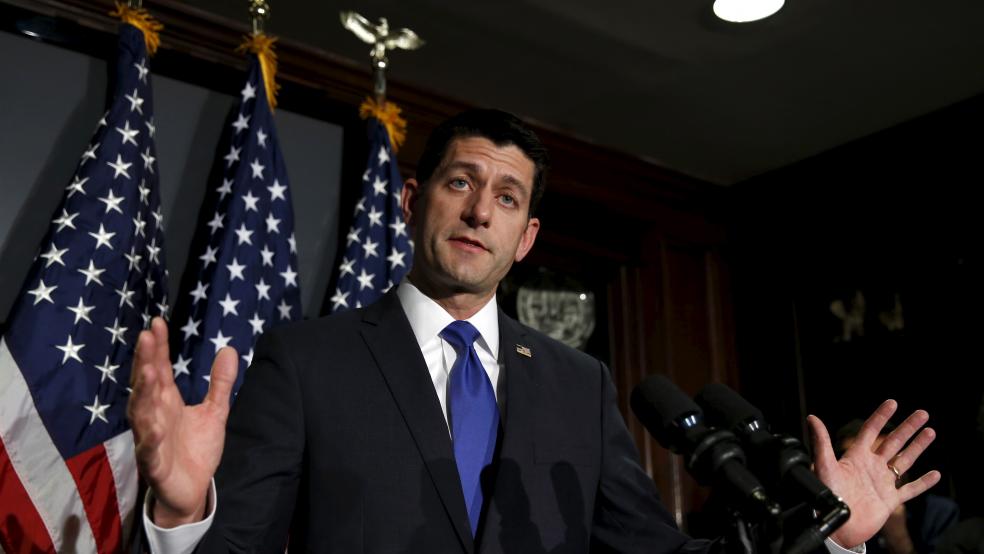House Speaker Paul Ryan (R-WI) on Tuesday delivered an ironclad, Shermanesque declaration that he has absolutely no intentions of stepping into the GOP presidential battle this summer if billionaire Donald Trump and Sen. Ted Cruz of Texas both fail to lock up their party’s nomination in Cleveland.
In a speech in GOP party offices just blocks from the U.S. Capitol, Ryan emphatically ruled out any last-minute appeal to convention delegates to make him their standard-bearer and save the party if the convention becomes hopelessly deadlocked.
Related: Why Paul Ryan Will Dodge the GOP Presidential Snake Pit
Instead, he intends to continue working to shape a new economic and social agenda for the GOP that will enable his party to cling to majorities in the House and Senate, even if Trump or Cruz leads the party to disaster in the November general election – as polls are pointing to more and more.
“We have too much work to do in the House to allow this speculation to swirl or have my motivations questioned,” Ryan told reporters. “Let me be clear: I do not want, nor will I accept the Republican nomination.”
Then, speaking directly to the delegates who will gather in Cleveland this summer to choose the nominee, Ryan said, “If no candidate has a majority on the first ballot, I believe you should only choose a person who actually participated in the primary. Count me out. I simply believe that if you want to be the nominee – to be the president – you should actually run for it. I chose not to. Therefore, I should not be considered. Period.”
Ryan, 45, a veteran House member and the 2012 vice presidential nominee, has repeatedly sought to dampen speculation that he might step in and salvage his party if Trump and Cruz prove too toxic for the GOP and can’t amass the 1,237 delegates needed to claim the nomination.
Related: Why the GOP Won’t Give Up on Paul Ryan as a Presidential Nominee
Trump – with 743 delegates already in his pocket -- could still lock up the nomination before July, beginning with a strong performance next Tuesday in the New York primary, and then moving on to Pennsylvania, Connecticut and other northeastern states.
Trump leads Cruz and Ohio Gov. John Kasich in New York with more than 50 percent of the vote, according to recent polls, and he continues to lead the field in national polling.
But Trump and Cruz are so unpopular among Republican and Democratic voters that Democrats Hillary Rodham Clinton and Bernie Sanders lead them in hypothetical matchups in recent polls.
And for all his protests, Ryan and his aides intentionally or otherwise stoked speculation with foreign travel and a series of high-minded speeches and videos that sounded downright presidential.
Related: Team Trump Stirs the Pot Again, Says Cruz Using 'Gestapo Tactics'
But Ryan insisted he was merely doing what he committed to do when he succeeded John Boehner as speaker.
“When I accepted this speakership, I did so on the condition that I would do things differently than they were in the past,” he said. “For one, I made clear that this would be a policy and communications-focused speakership. And secondly, I made clear that we would put together a policy agenda and offer a clear choice to the American people.
“That’s what I told my colleagues I would do, and it’s exactly what I’ve done,” he added.
Ryan, a policy wonk and former chair of the House Budget and Ways and Means Committee, once again enunciated the House GOP agenda, including embracing free enterprise and rejecting “crony capitalism.”
“I believe we can once again be that optimistic party that is defined by a belief in the limitless possibility of our people. We want to be a party defined by solutions... by being on the side of the people. We want to take our principles and apply them to the problems of the day.”
When pressed by a reporter to explain why people should take him at his word about the presidential campaign when he changed his mind last year and accepted the House speakership after repeatedly insisting he wasn’t interested.
“Those are apples and oranges,” he said. “Being speaker of the House is a far cry from being president of the United States,” he said. ”Specifically, I was already in the House, I’m already a congressman. So I was asked by my colleagues to take a responsibility within Congress, which I already was serving from the one that I had. That’s clearly different than getting the nomination for president of the United States by your party without even running for the job.”





